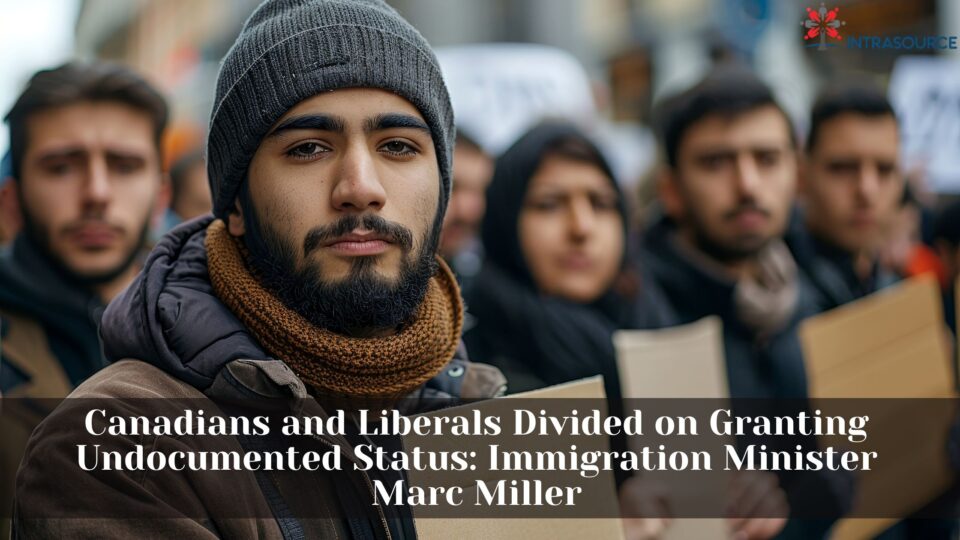Immigration Minister Marc Miller navigates division among Canadians and within the Liberal Party regarding the regularization of undocumented status, despite recognizing humanitarian and economic benefits.
Immigration Minister Investigates Regularization Options
Immigration Minister Marc Miller has revealed that the Canadian government is actively exploring methods to provide status to some undocumented people within the country. However, Miller acknowledges that there is no collective agreement on this issue, neither among Canadians nor within the government caucus.
Economic and Humanitarian Considerations
In a discussion aired on CBC’s The House, Miller expressed a positive outlook on regularizing the status of undocumented residents from both humanitarian and economic perspectives. Nevertheless, he admitted that the lack of consensus causes him to hesitate before taking any definitive action.
“I think from a humanitarian perspective it makes sense. From an economic perspective, it makes sense,” Miller told host Catherine Cullen. “That said, I don’t think there is a consensus in Canada as to whether to do this or not. I would venture even to say that there isn’t necessarily a consensus in our caucus. That causes me to pause.”
Liberals’ Commitment and Public Debate
In late 2021, the Liberals committed to “explore ways of regularizing status for undocumented workers who are contributing to Canadian communities.” Prime Minister Justin Trudeau mentioned that there is no set timeline for implementing this proposal.
“There needs to be either a pathway towards regularization and citizenship, which I know the (immigration) minister is working on. In some cases, we need to accelerate deportation proceedings,” Trudeau stated earlier this year.
Broad Program for Undocumented People
Miller spoke about planning an extensive program for regularization in an earlier interview with the Globe and Mail last December. He estimated the number of undocumented individuals in Canada to be between 300,000 and 600,000.
“They’re not Canadians, but for any other purposes, they are Canadians, fully integrated into society. They’re not an impact on housing but they’re working in the grey market because for a variety of reasons — and this has been documented over time — they just don’t have the right papers,” Miller elaborated.
Pressure from Migrant Advocacy Groups
The government faces increasing pressure from migrant advocacy groups such as the Migrant Rights Network. In May, Syed Hussan of the Migrant Workers Alliance for Change emphasized that regularization is crucial for Prime Minister Trudeau’s commitment to equality, diversity, and inclusion.
“Regularization is a litmus test of Prime Minister Trudeau’s commitment to equality, diversity and inclusion,” said Hussan.
Cabinet Discussions Ongoing
Although regularizing undocumented people has been discussed in cabinet meetings, Miller confirmed that no conclusive agreement has been reached.
“We are in the process of looking at this as a cabinet and there is no agreement as of yet as to where this will go,” he stated.
Political Context of Immigration Debate
Immigration Minister Marc Miller has indicated that the federal government is actively exploring options to grant status to some of the undocumented individuals currently residing in Canada. The issue, however, remains deeply divisive both nationally and within the governing Liberal Party. While there are humanitarian and economic arguments supporting the regularization of undocumented people, the lack of consensus complicates potential actions.
The Liberals committed in their 2021 pledge to consider pathways for undocumented workers to gain legal status, but concrete steps have yet to follow. Prime Minister Justin Trudeau has stated that while pathways toward regularization and citizenship are being considered, more decisive action on deportation proceedings may also be necessary.
Groups advocating for migrant rights, such as the Migrant Rights Network, have urged the government to fulfill its promises as a measure of its commitment to equality, diversity, and inclusion. Meanwhile, broader discussions on immigration intersect with significant political debate concerning housing affordability and other economic issues.
Minister Miller’s acknowledgment of these debates underscores the complexity of navigating a policy direction that would satisfy humanitarian goals while addressing intricate socio-economic impacts. The government continues to face pressure from multiple fronts as it deliberates on feasible solutions for regularizing the status of undocumented individuals.
Immigration Linked to Housing and Health Care Capacity
Conservative Leader Pierre Poilievre has pledged to connect immigration levels to the number of houses built in Canada and the capacity of the health care system. However, he has not specified whether he would adjust permanent resident targets or reduce the number of non-permanent residents.
Government Perspective on Regularization Programs
Speaking to The House, Miller highlighted that other countries have seen both successes and challenges with regularization programs. While supportive of regularization, he noted that it’s ultimately not his decision to make.
“We’ve taken on a lot as a government and with a year and a half to go [before the next fixed election], the question is, is this the right time?” Miller said.
“I think it is. But I’m not the final voice in this and not the final authority in this, nor should I be.”


